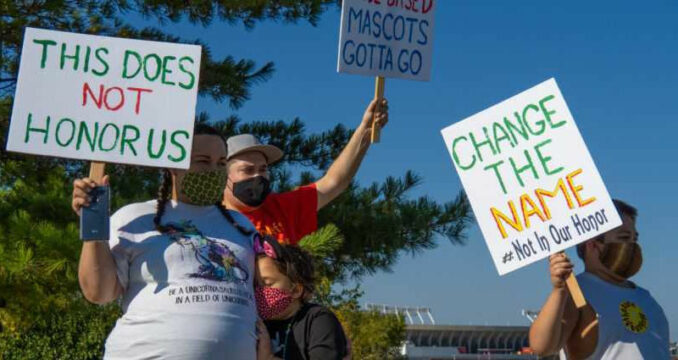Super Bowl can’t disguise systemic racism, big profits
WW commentary
The most popular one-day sports event in the U.S. happened on Feb. 12 this year in Glendale, Arizona — Super Bowl LVII. The two teams that played for the National Football League championship were the Philadelphia Eagles and the Kansas City team — whose ownership to this day refuses to change its racist logo and mascot.

Indigenous protest against Kansas City NFL team name.
The nauseating display of majority-white Kansas City fans defaming Native heritage will no doubt create an ugly stain on the game.
Years of protests organized by Indigenous-led coalitions forced the Washington team, now named Commanders, to change their image and mascot, which had offended Indigenous peoples. And the day will come soon when Kansas City will have to do the same.
Kisha James, co-leader of United American Indians of New England and an enrolled member of the Wampanoag Tribe of Gay Head Aquinnah, told Workers World: “The appearance of the Kansas City NFL team at this year’s Super Bowl exposes U.S. anti-Indigenous racism for all the world to see.
“In addition to the team’s name and the images associated with it, the Kansas City fans can be counted on to show up wearing redface and feathers and ready to do their ‘tomahawk chop’ at every opportunity. NFL teams now have ‘End Racism’ stamped in their end zones, but apparently that sentiment does not apply to Indigenous people.
“We join Native organizations around the country in the ongoing demand that the NFL and other sports leagues immediately ban the use of Native team names, mascots and stereotypes.”
More racism within the NFL
For the first time in Super Bowl history, this year’s game featured two opposing Black quarterbacks, Jalen Hurts and Patrick Mahomes. Yet there is no hiding the disgraceful lack of Black head coaches. In a League where the players are 60% African American, there are only two African American coaches, Todd Bowles of the Tampa Bay Buccaneers and Mike Tomlin of the Pittsburgh Steelers, on the 32 teams.
Of the 32 NFL teams, the billionaire owners — bosses who do the hiring and firing of coaches — are 99% white. As was stated in a Jan. 17, 2023, WW editorial, “Black NFL coaches face increased injustice”: “A damning report released on Sept. 21, 2022, by the Washington Post showed data confirming that Black coaches are twice as likely to be fired compared to white coaches, if their teams have either a winning record or stay even.
“The report states that while Black head coaches perform on the same level as white coaches, they have faced a more difficult path toward becoming head coaches than their white counterparts. Black coaches have had to serve significantly longer terms as mid-level assistants, are more likely to be given interim jobs than full-time coaches and are held to a higher standard when it comes to keeping their jobs.” (workers.org/2023/01/68643/)
Super Bowl = superprofits
The annual Super Bowl is not only the most popular U.S. sporting event but the most profitable. NFL.com reported that over 200 million viewers, two-thirds of U.S. households, watched SB LVI. Billions of people around the world watched the event, broadcast in over 130 countries and in 30 languages.
Players on the winning team will receive $157,000, and players on the losing side will receive $82,000. The NFL organization will add close to $2 billion to its coffers in merchandise sales and tens of millions of dollars in ticket sales, with the cheapest ticket price amounting to over $3,200 a ticket.
Fox, CBS and NBC networks rotate the rights to broadcast the Super Bowl and collectively pay the NFL $3 billion to air the game. Fox has the rights this year.
And during the showing of SB LVII, corporations will pay Fox an unprecedented $7 million for each 30-second ad. You read right — $7 million!
Also the American Gaming Association estimates $16 billion in legal bets will be placed on the Super Bowl nationally, with most of the profits going to casinos and other betting sites.
The Super Bowl is just another reminder that decisions that maximize profits outweigh resolving any social-justice issues that continue to plague the NFL. This is like any other sector of U.S. capitalist society, whether the issue is superexploitation of the players (who may be well-paid but are still workers) or white-supremacist practices on and off the field. U.S. sports under capitalism are treated like every other Wall Street venture.

